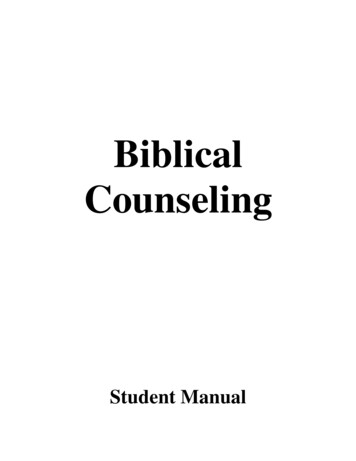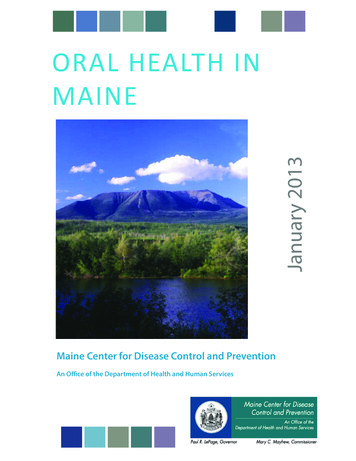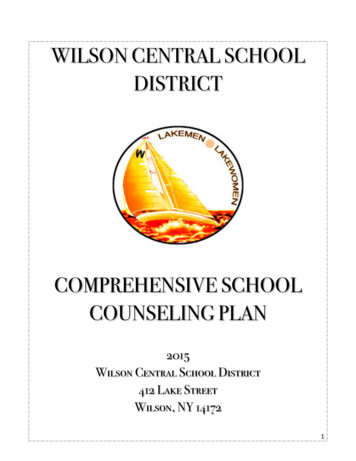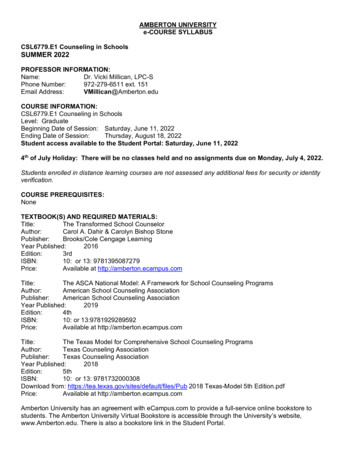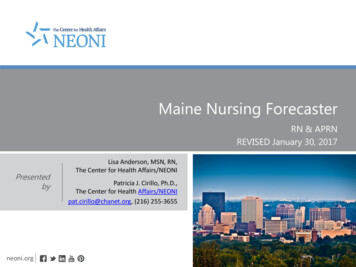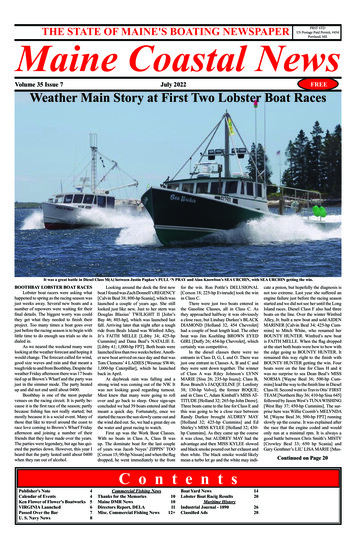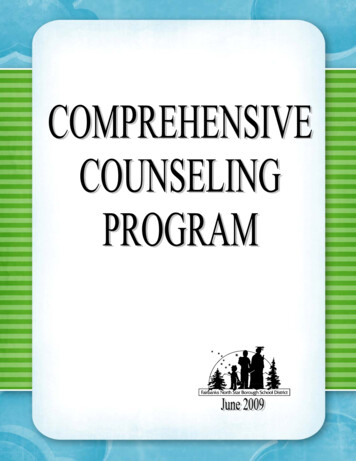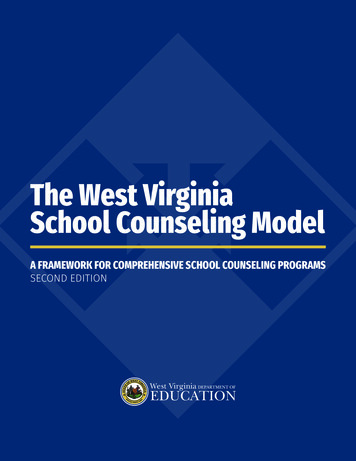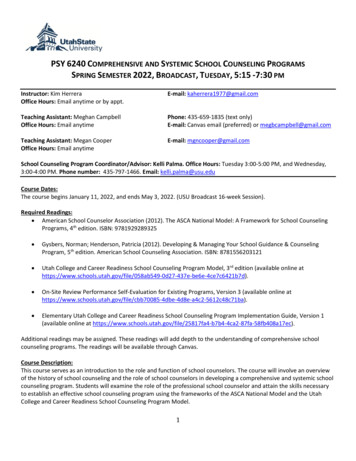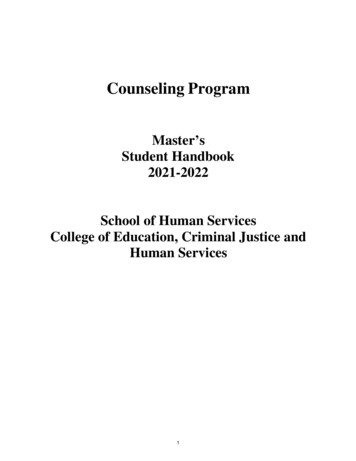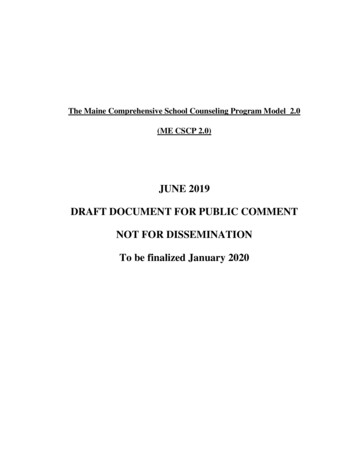
Transcription
The Maine Comprehensive School Counseling Program Model 2.0(ME CSCP 2.0)JUNE 2019DRAFT DOCUMENT FOR PUBLIC COMMENTNOT FOR DISSEMINATIONTo be finalized January 2020
Dear Maine School Counselors,With the hard work and determination of several PreK-12 school counselors from across Maine and theleadership of Erin Flynn (Oxford Hills Comprehensive High School) and Anastasia Alexis (Deering HighSchool), school counselors and school administrative units (SAUs) now have a model Comprehensive SchoolCounseling Program (CSCP) in which to guide them in developing a CSCP that is consistent with the duties ofthe school counselor. Maine’s model CSCP is aligned with the American School Counselor Association’sNational Model which ensures equitable access to a rigorous education for all students, identifies theknowledge and skills all students will acquire as a result of its implementation, is delivered to all students in asystematic fashion, is based on data-driven decision making, and is delivered by a state-credentialed schoolcounselor.This work is essential to an SAU’s Comprehensive Education Plan, as determined under Maine DOE’s PublicSchool Approval requirement, which indicates that in an SAU’s certification and approval process, submittedannually by the superintendent, it must contain a CSCP.Comprehensive School Counseling Programs, driven by student data and based on standards in academic,career and social/emotional development, promote and enhance the learning process for all students. Themodel CSCP was written to acknowledge Maine’s Learning Results and currently the MLRs are being revisedso that in the future, the model CSCP will include an up-to-date cross-walk with the ASCA Mindsets &Behaviors for Student Success: K-12 College- and Career Readiness for Every Student to ensure the highestlevels of effectiveness in its implementation.School counselors are encouraged to collaborate with district and school leadership to review this model CSCPand add to it specific academic programming and greater school community resources, requirements, andinformation.Thank you for the great work that you do every day for PreK-12 students in Maine. With your support, everystudent will have the skills and tools necessary to be successful in their learning and within the schoolcommunity.Sincerely,Sarah H. AdkinsStudent Assistance CoordinatorMaine Department of Education
The Maine Comprehensive School Counseling Program Model 2.0 (ME CSCP 2.0)Table of ContentsAcknowledgmentsIntroductionBenefits of a Comprehensive School Counseling ProgramFoundationBeliefsVision StatementMission StatementProgram GoalsASCA Mindsets & Behaviors for Student SuccessOther Standards for ConsiderationProfessional Development & ResponsibilityASCA School Counselor Professional Standards and CompetenciesEthical Standards/CodeEthical Decision Making ModelAdvocacyManagementSchool Counselor Competencies AssessmentSchool Counseling Program AssessmentUse of TimeAppropriate vs Inappropriate School Counseling ActivitiesAnnual AgreementsAdvisory CouncilSetting up an Advisory CouncilUse of DataSchool data profileProgram results dataNeeds AssessmentAction PlansLesson PlansCalendarsDeliveryDirect Student ServicesSchool Counselor Core CurriculumIndividual Student PlanningResponsive ServicesIndirect Student bilityProgram ResultsCurriculum Results Report AnalysisSmall-Group Results Report AnalysisClosing-the-Gap Results Report AnalysisData AnalysisSchool Data Profile AnalysisSharing ResultsEvaluation and Improvement
School Counselor Competencies AssessmentSchool Counseling Program AssessmentSchool Counseling Process AssessmentSchool Counselor Performance AppraisalProgram Goals AnalysisReferencesAppendices
ACKNOWLEDGEMENTSThe Maine Comprehensive School Counseling Program Model 2.0 is the product of numerouscontributions of many dedicated professionals who are committed to transforming schoolcounseling programs in the State of Maine.Project CoordinatorsAnastasia Alexis, Ed.M., School Counselor, Deering High SchoolErin Flynn, M.S. School Counselor, Oxford Hills Comprehensive High SchoolCollaboratorsSchool Counselors in MaineElena Perello, EdD., (retired) School Counselor and Counselor EducatorBonnie Robbins, C.A.S., School Counselor, Whittier Middle School & ASCA Board of DirectorsKara Sprague, School Counselor, M.S, NCC, Messalonskee High SchoolKris Croteau, M.S., LCPC, School Counselor, Messalonskee Middle SchoolNicole Hatch M.Ed., School Counselor, Thomaston Grammar School,Deborah Drew, EdD., L.C.P.C., Counselor Educator, Husson UniversityKelly O’Brien, NBCT, C.A.S., School Counselor, Weatherbee School, RAMP Certified programMarisa Emerson, M.S., NCC, School Counselor, Portland High SchoolSarah Adkins, MS Ed. Student Assistance Coordinator, Maine DOESpecial AppreciationThank you to the authors of the first edition of the Maine Comprehensive School Counseling ProgramModel K-12, first published in 2005. They blazed a trail for us, leading the way as our state embarked ona new journey toward comprehensive school counseling programs for the State of Maine.Kate Clough, (retired) School CounselorLaurie Hall, School CounselorDavid Hanc, School CounselorTanya Reed, School CounselorLaurie Johnson, School CounselorDr. Elena Perello, (retired) School CounselorTim Walker, School CounselorShelley Reed, (retired) School CounselorMartin Lynch, School CounselorKarin Congleton, (retired) School Counselor
IntroductionThe Maine School Counseling Program Model 2.0 (ME CSCP 2.0) is a state-based systematic framework forhelping school counselors to design and implement comprehensive school counseling programs at a district orschool level. School counselors must have a minimum of a master’s degree from a school counseling programor concentration and the Maine DOE certification endorsement 075 School Counselor. School counselorsdeliver comprehensive school counseling programs at all levels of PreK-12 education with a focus onimproving individual student success and school climate. The ME CSCP 2.0 is designed to help certifiedschool counselors implement school counseling activities which are comprehensive in scope, preventative indesign, and developmental in nature. The American School Counselor Association (ASCA) National Model(2012) was used as a guide in developing the ME CSCP 2.0. The Maine Department of Education promotesthe description of the role of the School Counselor as stated by ASCA. See ASCA’s Role of the SchoolCounselor (Appendix)Comprehensive in ScopeA comprehensive school counseling program is, theoretically, extensive and far-reaching in its objectives. Theprogram should take into account the overall needs of stakeholders and should be accountable to students firstand foremost. A high quality school counseling program rests on the three pillars, or domains, of schoolcounseling: academic success, social/emotional development, and college/career readiness.Preventative in DesignA high quality comprehensive school counseling program provides for the majority (80% or more) of theschool counselors time to be spent on providing direct services to and indirect services on behalf of students.To meet this goal, a comprehensive school counseling program focuses on preemptive, school-wide activitiesand services that give students the skills they might need to problem solve, use resources effectively, and setgoals so that they may feel successful in school.Developmental in NatureA quality comprehensive school counseling program aims to ensure that students are able to meet standards forlearning. Identified standards should be agreed upon by the school counseling team. While school counselingstandards provide norms and benchmarks to show that students are proficient in the three domains of schoolcounseling, school counselors still meet each student where they are in their specific stage of development. Anoverarching goal of any school counseling program is to help students grow into active and responsiblemembers of society. Examples of standards to use include: ASCA’s Mindsets & Behaviors for Student Success:K-12 College- and Career-Readiness Standards for Every Student and the Maine Learning Results: Careerand Education Development. CED Standards are currently being revised and due to be finalized in.The ME CSCP 2.0, like the ASCA National Model, assists certified school counselors to implement schoolcounseling activities that are beneficial to a variety of stakeholders. Using the ME CSCP 2.0, along with
ASCA templates and publications, school counselors are guided in developing comprehensive programs thatare: Equitable Developmentally appropriate Integrated into the whole district or school Accessible to all students Driven by data Measurable Collaborative Preventative Accountable to the larger school community, families, and individuals Results oriented Within the recommended scope of practice Modifiable to fit a specific program Based on student standards for learning Supportive of overarching district goals and school specific missions Professionally responsibleBenefits of a Comprehensive School Counseling ProgramThe fundamental benefit of working from a comprehensive school counseling program is that a schoolcounselor can feel confident that they are providing services rooted in best practice. Furthermore, thecomprehensive school counseling program provides services that impact individuals, families, and the largerschool community. The following is a list of additional benefits afforded to a variety of stakeholders when aschool/school district implements a comprehensive school counseling program:Benefits for Students Provides access to school counseling services for all students Supports students in social/emotional, academic success, and college/career readiness Promotes a developmental approach in sequencing school counseling activities Increases the opportunity for counselor-student interaction Ensures equitable access to student services Works to close the achievement and opportunity gaps Provides activities rooted in data and school specific identified needs Establishes a system for a student's long-range planningBenefits for Parent(s)/Guardian(s) Provides support for parents regarding their child's academic success, social/emotional development,and college/career readiness Increases opportunities for parent-counselor interaction Provides an opportunity for parents to give input in school counseling program activities Provides an opportunity for partnership and supported advocacy in student planningBenefits for Teachers Provides a framework for collaborative and supportive working relationships Promotes a team effort to address developmental skills and core competencies
Provides a set calendar of developmentally appropriate activities that teachers can complementIncreases teacher accessibility to the counselor as a classroom presenter and resource personOffers an avenue to monitor key pieces of student data which are able to aid in student improvementProvides specific preventative, restorative, and responsive activities to support a classroom’s academicmissionBenefits for Administrators Creates a structured program with specific school counseling content Provides a means for measuring the effectiveness of school counseling programs through the use ofdata Provides a framework for collaboration and appropriate role delineation Enhances the positive image of the whole school Offers clarity on the role and scope of the school counselor and provides guidance for schoolcounselor evaluation Aligns the work of the school counselor with the school’s overall mission and student learningoutcomes Offers an avenue to monitor key pieces of student data which are able to aid in student improvement. Provides a rationale based on data for supporting a school counseling programBenefits for School Counselors Ensures the school counseling program’s contribution to the school’s mission *Clearly defines school counselor’s professional identity and role Supports access to every student Provides pre-designed measures and data collection methods Provides modifiable tools for program management, implementation, and evaluation Recognizes the school counselor as a leader, advocate, and change agent Assist with providing 80% of time on direct and indirect servicesBenefits to Social Worker, Crisis Response Teams, and Other Student Support Services Defines the role and practice of the school counselor Provides a model for collaborative student services Provides a model for preventative services for all studentsBenefits for Local Boards of Education Presents the rationale for including a district level, K-12 school counseling program Provides district patrons with current data regarding student competencies obtained through schoolcounseling program efforts Demonstrates the efficacy of the school counseling program, which can support funding Clarifies role and function of a school counselorBenefits for the Business & Labor Industry Provides increased opportunity for collaboration and active participation between counselors andbusiness Allows for diverse pathways between schools and places of employment Prepares a potential workforce with skills needed in career and postsecondary education (i.e. decisionmaking skills, time management, organizational skills, and increased maturity Increased understanding of workforce pathways Facilitates access to training opportunities and resources (i.e. financial aid)
Benefits to Counselor Educators “Builds collaboration between counselor education programs and schools Provides a framework for school counselor training programs Provides a model for site-based school counseling fieldwork or internships Increases data collection for collaborative research on school counseling programs Establishes a framework for professional development to benefit practicing school counselors Promotes alliances with other constituent training programs” (Bardhoshi, 2016)Benefits for Post Secondary Education “Enhances [opportunities for] matriculation and transition of students to postsecondary institutions Prepares every student for advanced educational opportunities Motivates every student to seek a wide range of substantial postsecondary options Encourages and supports rigorous academic preparation Promotes equity and access to postsecondary education for every student” (Bardhoshi, 2016)Suggested Steps in creating a Comprehensive School Counseling ProgramYear 1: Fall1. Read through the Maine Comprehensive School Counseling Program Model 2.0.2. Visit the appendix section to access tools and templates.3. Meet with other school counselors in your school or district as well as administrators to discuss yourintent, get support for, and discuss the delivery of your comprehensive school counseling program.4. Write and adopt components of the program’s foundation (beliefs, mission, vision, & program goals).5. Complete a school-wide needs assessment.6. Complete a school counselor competency assessment to identify areas where you’d like to focus onprofessional growth and learning for next year.Year 1: Spring7. Complete a program assessment and compare your current program with the ME CSCP 2.0.8. In June, connect with the district’s ESEA coordinator to review your district’s Comprehensive NeedsAssessment and if applicable, the school’s improvement plan.9. Complete the school data profile to identify relevant data elements to look over.10. Create tentative Action Plans.11. Review relevant data elements to identify areas for possible school-wide interventions and programimprovement.12. Identify assessment and organizational tools to align with the areas of improvement that have beenidentified (ex: Use of Time Assessment).13. Develop a one-to-three-year plan for implementation. Include a clear timeline and a chart delineatingthe division of responsibility.14. Create the following year’s annual calendar including dates for the different elements listed in themanagement section.Year 2: Fall15. Complete a management agreement with administration.
16. Identify other educators to collaborate with on the implementation of the comprehensive schoolcounseling program.17. Present the plan to administrators and other relevant stakeholders.18. Implement the plan and collect data on program implementation using the tools in the managementsection.Year 2: Spring19. Complete a second Use of Time Assessment20. Analyze program data collected to determine results of program using tools from the accountabilitysection.21. Share your results with appropriate stakeholders.22. Complete a second program assessment.After implementation, consider applying for the Recognized ASCA Model Program (RAMP) designation toshow how your program makes a difference in student achievement and success.The Four Components of a School Counseling ProgramA comprehensive school counseling program has four components.Foundation is the base of the rest of the model. It includes elements such as the program’s beliefs andmission. These elements help to dictate what students should be learning (within the academic,social/emotional, and college/career domains) as a result of the comprehensive school counseling program.The management component provides school counselors with tools and assessments to organize, implement,and evaluate their school counseling program. The delivery component provides school counselors with waysin which to implement the school counseling programs. The delivery section outlines the direct activity schoolcounselor provide for students as well as the indirect services school counselors provide on behalf of students.The delivery component ensures a student’s needs and learning goals are met. The accountability componentprovides guidance on how school counselors can analyze the data they’ve collected using the tools from themanagement section. The accountability section helps school counselors investigate how their programming ispositively impacting students and outlines the ways in which to report that impact to key stakeholders.FOUNDATIONBeliefsExploring shared beliefs allows counseling departments to develop the mission statement and implementthe school counseling program. Each team member should contribute to the discussion, keeping in minddifferent points of view.“Recommended ASCA Exercise on Developing Beliefs: What do we believe about the ability of all students to achieve? How do we address developmental needs of all students? What is the school counselor’s role as an advocate for every student?
Who do we believe is involved in the planning, managing delivery and evaluation of programactivities?How are data used to inform decision making?How do ethical standards guide the work of school counselors?” (ASCA National Model, 2012)Example 1“As school counselors, we believe that a comprehensive counseling program is a necessity to the successof all students. The counseling program should be able to assist students in three areas: personal/social,education, and career. We believe that it is our job to work with students to enhance their achievement inorder to become successful, productive citizens. We believe that all students are unique and all studentsface challenges. It is our job to work diligently with students to assist them in making decisions, findingpaths, and a course of action to help them grow and develop. We believe that along with being anadvocate for the students, we are also to be advocates for parents, the school, and the community. In orderfor us to be successful as school counselors, we understand that we must possess certain characteristics.The characteristics that we possess and feel are essential are: empathy, passion, and non-judgment. It isimportant that we treat every student with the utmost respect and understanding, regardless of sex, race,religion, sexual orientation, or academic achievement. Every child is precious and deserves a passionateand fair counselor.” (Bay Minette Middle School, Alabama)Example 2“The members of the Shaler Area School District School Counseling Department believe that anexemplary school counseling program should:1.2.3.4.5.6.7.8.Be an integral part of the total school program.Equip students with the skills necessary for them to achieve their career goals.Utilize a team approach to eliminate barriers in school achievement.Conduct activities that contribute to the development of a positive school climate.Recognize students’ individual abilities and assist them in maximizing their potentials.Help students develop a healthy self-concept and an acceptance of individual differences.Link programs with opportunities for students outside of the school.Include the participation of teachers because of their direct involvement with students on a dailybasis.9. Foster a positive relationship between home and school.10. Strive for professional excellence through continued study and participation in professionalorganizations and workshops.” (Shaler Area School District, Pennsylvania)Vision StatementA discussion about vision builds off of the discussion of beliefs and becomes the picture of the ultimateoutcome for students specifically related to academic, career and college readiness, social/emotional orother related outcomes. The vision statement for the school counseling program aligns with the vision ofthe school and district (National School Boards Association, 2009).Example 1
“The vision of the Evans City Elementary School Counseling Program is to provide a preventative,responsive and comprehensive program that cultivates academic, personal/social, and career connectionsfor all students. Through advocacy, character development, leadership, and collaboration, self- awarenessand academic achievement will evolve within a data-driven, multi-tiered rigorous educationalenvironment and support system. Our vision is that this will ensure that all students understand andembrace their own value and have an intrinsic motivation to contribute to their community and a diverseworld, as they become members of a global workforce.” (Evans City Elementary School)Example 2“All students at Weatherbee School are strong, committed life-long learners and community membersbuilt by rigorous academic, social and emotional practices. Students at Weatherbee School arecompassionate and emotionally intelligent. They demonstrate empathy, resilience, inclusiveness andmulticultural awareness that allow them to be world-class leaders. Weatherbee students are well preparedto participate in equitable college, career and civic opportunities and ultimately to become leaders on aglobal scale and make positive and impactful changes in our future world.” (Weatherbee School,Hampden)Mission Statement“One of the essential aspects of the foundation for a school counseling program is the mission statement.In the early development of the school counseling program, it is critical to determine a mission statementthat gives overall direction and vision to the program. The statement should be specific, concise, and clearas to the intent of the school counseling program. A solid connection must be established with theeducational mission statement.” (Connecticut Comprehensive School Counseling Program)“The mission statement describes what the school counseling program does. It is a clear and concisestatement that defines how your school counseling program reaches the long-range results described inthe vision ” (ASCA National Model Implementation Guide)The mission statement content should:1. “Be written with students as the primary clients2. Advocate for the equity, access and success of every student3. Show linkages with the school, school district or state department of education missionstatements4. Indicate the long-range results desired for all students” (Maine Comprehensive School CounselingProgram Model K-12, 2005)5. Align with visionExample 1“Since education is a lifetime, dynamic process, the K-12 School Counseling Staff supports the YarmouthSchool System in its commitment to ‘Empower All Students to Create Fulfilling Lives in a ChangingWorld’. We strive to provide the necessary and fundamental means by which all students may work toattain their personal goals. In this commitment to excellence, it is our purpose to enhance skills, toencourage ethical behavior, and to create a learning environment that fosters intellectual, moral, physical,emotional and social growth. In so doing, all young people are provided with the means by which they
can develop into open-minded, mature individuals, and responsible members of society. Thus, they arebest equipped to live well-balanced, productive, and satisfying lives.” (Yarmouth School Department,Yarmouth)Example 2“The mission of the Weatherbee school counseling program is to provide a safe, positive and challenginglearning environment of respect and caring for all students. Students reach their individual potential andbecome lifelong learners who are self reliant, creative and responsible citizens. The Weatherbee Schoolcounseling program partners with staff, families and community members and uses data to provideequitable access to resources and success for all students in the academic, personal and social/emotionaldomains throughout their lives. “ (Weatherbee School, Hampden)Program Goals“Program Goals define how the vision and mission will be accomplished and guide the development ofthe curriculum, small group and closing the gap action plans.” (Dimmit, Carey & Hatch, 2007). “Goalsetting, based on school specific data gives focus to the school counseling program.” (ASCA NationalModel, 2012) The SMART goal format developed by Doran (1981) is a tool for ‘developing specific,measurable, attainable results’ all within a specific timeframe. (ASCA National Model, 2012). SchoolCounselors should use outcome data based on behavior, attendance or achievement in their programgoals. When developing goals it may be helpful to develop an inventory of services and interventionsalready provided. Exploring and aligning with your district’s Comprehensive Needs AssessmentLooking at data to address achievement gaps and inequity in your school is also another option.Example 1“By Dec 19, 2016, (end of first semester) the cumulative number of absences in kindergarten willdecrease by 50 percent from 36 during the first semester to 18 during the second semester.Data source: First semester critical absence report (report generated by school data clerk at the request ofcounseling department). A review of the first-semester critical absence report disaggregated by gradelevel indicated kindergarten students had the most absences during the first semester.” (ASCA NationalModel, 2012).Learning Outcomes and StandardsASCA Mindset and Behaviors for Student SuccessThe ASCA standards are organized into three domains: academic, career and personal/social.These competencies provide direction for developing an effective comprehensive school counselingprogram. me/MindsetsBehaviors.pdf
The National Career Development GuidelinesThese standards cover four domains: Personal Social Development, Educational Achievement, Lifelong Learning,and Career Managementwww. ncda.orgMaine Learning Results Career and Education Development StandardsThese standards highlight the importance of goal setting, decision-making, and habits of mind within thecontext of learning other content areer/standardsCollaborative for Academic, Social and Emotional LearningCASEL’s integrated framework promotes intrapersonal, interpersonal, and cognitive competence. Thereare five core competencies: Self Awareness, Self Management, Responsible Decision Making, SocialAwareness and Relationship Skills.https://casel.org/corecompetencies/State of Maine Health and Physical Education StandardsThese standards focus on analyzing the reliability and validity of media, technology and health resources;communicating effectively using refusal and conflict-management skills; being better consumers ofinformation; managing life challenges and stress; setting goals; and making healthy nt/healthphysed/standards
Professional Development & ResponsibilitySchool counselors must be advocates for themselves and the profession. School counselors must adhere tothe ASCA Ethical Code and be knowledgeable about the ASCA Professional Competencies.Membership in a professional school counseling organization, such as ASCA and MESCA isrecommended in order to stay up-to-date on current issues facing school counselors. Membership in otherprofessional counseling organizations (MeCA, ACA, NCDA, MeCDA) as well as adherence to codes ofethics beyond ASCA, can serve as additional resources for school counselors. Continuing education isrequired for not only maintaining certification, but to stay informed of professional practices. Both theUniversity of Southern Maine and Husson University offer continuing graduate education courses incounselor education. School counselors who wish to earn a Certificate of Advanced Study at a Maineinstitution may do so at USM. State and national conferences as well as local workshops also provideprofessional learning opportunities to access important resources and information for school counselors.Having time to meet as a Pre-K-12 school counseling team is also important as it allows for discussionand learning about comprehensive program planning, grade level transitions, case conferences, datareview and peer supervision. When a school district holds an in-service day, it would be of value toschool counselors to collaborate with administration to plan professional learning that is specific to theneeds of school counselors. It can also be noted that clinical counsel
The American School Counselor Association (ASCA) National Model (2012) was used as a guide in developing the ME CSCP 2.0. The Maine Department of Education promotes the description of the role of the School Counselor as stated by ASCA. See ASCA's Role of the School Counselor (Appendix) Comprehensive in Scope
